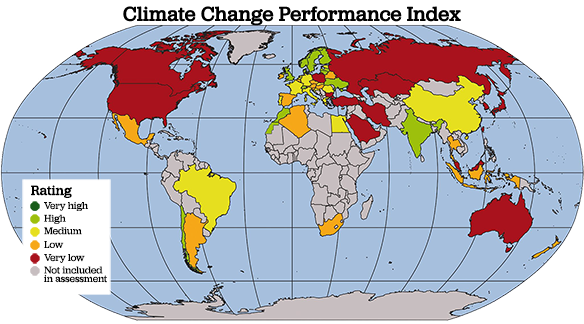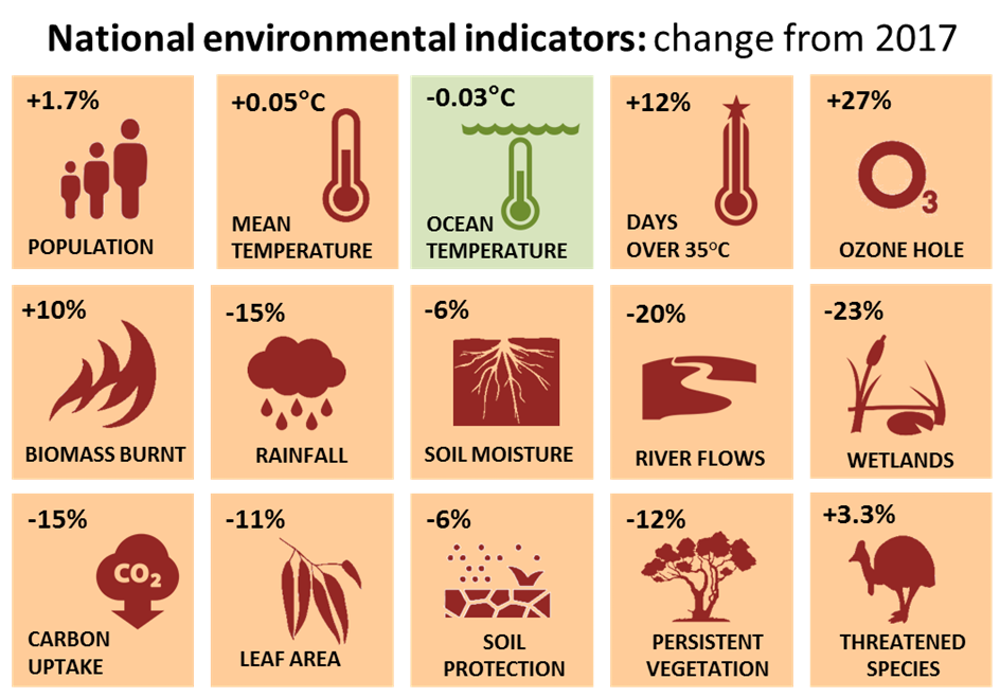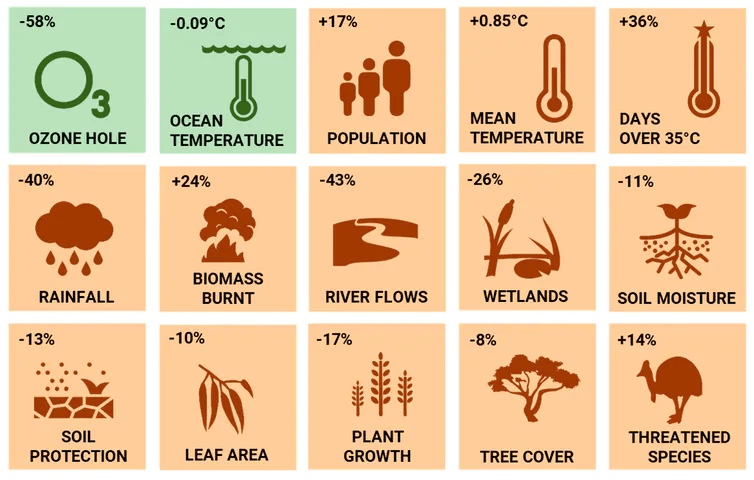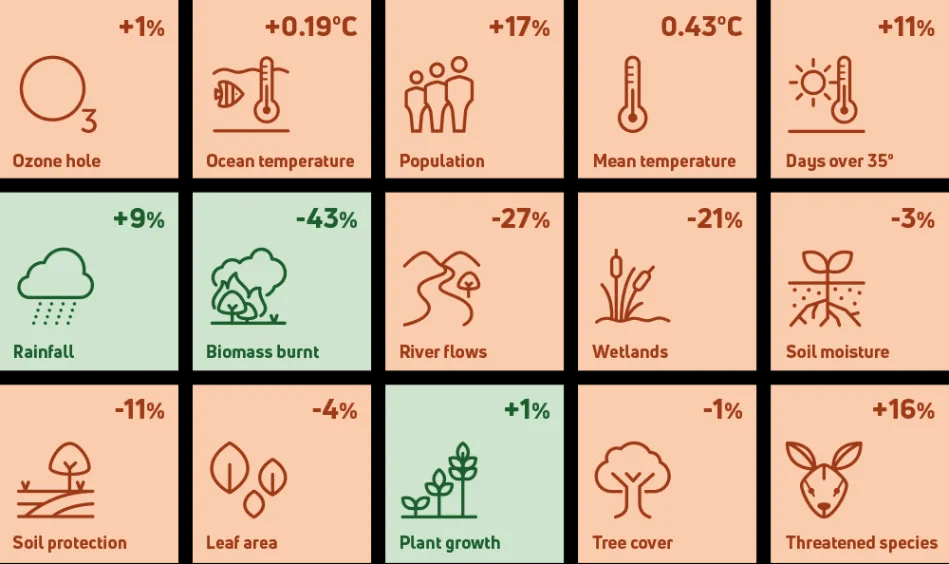The wildfires that raged in Australia in 2019-2020 were unprecedented in that country's history. Although they had always occurred, these were very different. They started sooner and were much bigger and fiercer, lasted longer and - what was most worrying - were affecting a greater diversity of landscapes, including forests that had not burned for thousands of years.
The environmental damage is apocalyptic. So far an estimated 3,000,000,000 animals have been killed or displaced (not counting insects) and over 186,000 square kilometres have gone up in flames.
The causes of this dramatic increase in scope and ferocity of the fires are abundantly clear:
- the global rise in temperatures brought about by climate change, creating extremely dry conditions
- the astounding persistence of climate-change denial among the Australian people, preventing effective countermeasures
- the mismanagement of natural water resources, removing ever more moisture from an already dry environment
- the extreme mismanagement of the environment in general
The significance of this tragedy cannot be overstated. It is a grim reminder of the price of human folly and an ominous warning of things to come.
At a time when all experts agree that the environment is in crisis and desperately needs to be protected and restored, such losses are intolerable.
The acute dangers of climate change and in particular global warming are perfectly clear. In Australia they are magnified by governments that deny climate change, are unwilling to do anything about it and actively promote industries that cause it. This has taken Australia to the bottom of the Climate Change Performance Index (CCPI), an independent monitoring tool for tracking the climate protection performance of countries. Australia ranks 53 out of 58.
Another report (Brown to Green), which measures the performance of G20 countries on climate change adaptation and mitigation also found that "Australia is behind on climate action in nearly every dimension."
There can be no doubt that all this destructive behaviour must have played a big part in the occurrence and severity of the fires, making those responsible criminally liable. It would not be a bad idea to sue them, for instance under section 22 of the Crimes Act 1958 (Vic) on Reckless Conduct Endangering Life, which carries a 10-year term of imprisonment. Such actions have been brought successfully in other countries.
Another major cause of the fires is irresponsible water management. Enormous quantities of surface water and groundwater are extracted from the environment for human use. Naturally this makes already arid conditions dramatically worse. This is not just an Australian problem. All over the world freshwater resources are being depleted, posing grave dangers to nature but also to human food security.
A prime example in Australia is the disastrous handling of the Murray-Darling Basin, an important water system, collecting water from more than one million square kilometres. It produces about 40% of the country's agricultural output. During the 20th century it was converted into a vast irrigation system for human use, with little regard for the environment. Irresponsible governments promoted human developments far beyond the capacity of the system. Inevitably the excessive extraction of water did severe harm to nature, drying out the soil, emptying rivers, lakes and wetlands, making it more susceptible to wildfires. The region became a battleground pitting state against state, towns against rural areas, conservationists against irrigators and small farms against government-backed super farms. Small farmers and nature became the big losers, the former driven into bankruptcy and suicide, the latter steadily deteriorating further.
After two major disasters, the latest in 2019 with hundreds of thousands of fish dying, some attempts were made to restore water to the environment, but with little success, mainly because of opposition from the large irrigators.
Another, rarely mentioned, problem is the decline of groundwater levels. This is happening all over the world. Australia is no exception. Naturally this, too, means less and less water for the environment, adding yet another cause for drier conditions favoring wildfires.
Deforestation also has a harmful effect on local weather. Healthy forests benefit their surroundings. They lower average temperatures, absorb water when it is plentiful and transpire it during dry spells. Amazonian rainforests, for instance, make their own rain.
Australia is among the 11 worst countries for deforestation (on a par with Brazil) according to the WWF. It is clearing huge tracts of land for the cattle industry, adding injury to injury because cattle are major greenhouse gas emitters. It is also senseless, because the cattle industry has no future. It will have to scale back drastically or be destroyed by worsening droughts, in which case deforestation will only have led to desertification and the needless killing of millions of wild animals.
All these harmful activities are symptomatic for the disastrous route Australia has taken under recent governments, apparently with the full support of a large number of voters, because they freely elected them.
Every year the Australian National University publishes an environmental scorecard. For 2018 it was horrific. It shows the changes from 2017, which - according to the scientists - was "already quite bad".
It reads like a suicide note. Everything is in the red, but for a minor decrease of ocean temperature.
Things were obviously no better for 2019.
The 2020 was a little less bad, mainly because the fire season was not as disastrous as the year before.
It is astonishing that one of the richest countries in the world should also be among the world's worst performers in environmental protection.
A few more examples:
- Australia's ecological footprint per person is 4.1 (meaning that we would need 4 earths if everyone lived like Australians)
- Its biocapacity reserve plummeted from 21.7 in 1961 to 5.7 in 2016 (this is a purely local figure referring to the biocapacity of a country minus its population's footprint)
- It is among the top 7 countries responsible for 60% of the world's biodiversity loss
- Its extinction rate for mammals is the highest in the world
- With a population representing only 0.33 % of the world population it is responsible for the emission of 5% of global greenhouse gases and actively striving to raise that percentage to 17% by 2030.
And then there is the Great Barrier Reef, the world's largest coral reef system. Another tragedy in the making. It is one of the world's seven natural wonders, one of UNESCO's World Heritage Sites, which means that it is a place of extraordinary global importance.
Any country should feel privileged to have such a treasure within its boundaries and do everything to preserve it. Not so Australia. Although the reef also has a high economic value, governments have failed to take meaningful action to protect it from an onslaught of damaging impacts by humans. In an act of inconceivable madness they even pressurized UNESCO to keep the GBR off the "In Danger" list, because "it would harm tourism".
So far they have succeeded. UNESCO still does not list it (May 2021) but the International Union for Conservation of Nature has declared it to be in "critical" condition.
For decades the reef has been subjected to all kinds of human threats, such as:
- physical damage from coastal development, dredging, quarrying, destructive fishing practices
- sedimentation from coastal development, interfering with coral's ability to feed, grow and reproduce
- excessive nutrients from agricultural and residential fertilizer use and animal waste
- toxic substances, metals, chemicals and pesticides in industrial, urban and agricultural runoffs, mining activities and runoffs from landfills
- trash and micro plastics
- overfishing
- needless, outdated and ineffective shark killing programs that harm the marine ecosystem and other animals
- aggressive and unscrupulous campaigning by commercial interest groups to prevent protective measures
- the unwillingness of authorities to take action against commercial interests
All this severely damaged the reef and decreased its resilience, making it more vulnerable to the marine heatwaves that struck in 2016 and 2017 and killed off 30 to 50 per cent of the reef's coral. A few more of these events will probably kill off the reef entirely, and they are almost a certainty if drastic global action is not taken immediately.
The list goes on and on, but one conclusion is inescapable. Australia is a major and growing threat to the environment, both nationally and internationally.
The most alarming thing about this catastrophe is without a doubt the feeble response of people in the country itself and around the world. This could and should have been a defining moment in humanity's history. The moment that we all woke up to the reality of climate change and the urgency of doing
whatever it takes to stop it. Obviously without resorting to other environmentally harmful activities.
The moment has passed. No meaningful action has been taken. It is business as usual…. until the next major disaster.
The media were also at fault, as always about the environment. There was some excitement, but not for long. Many news agencies did not even mention the immense destruction of wildlife and environment, merely focusing on the human cost, deeply tragic, of course, but also relatively small, bearing in mind that a region as large as Syria was devastated.
And this, the utter disregard for nature, is precisely the root cause of all these problems. If we had shown nature the respect it deserves (and demands), there would have been no climate change, no global warming and no wildfires of this magnitude.
"These fires show that the wicked, self-destructive idiocy of climate denialism must stop"
Malcolm Turnbull
"The forest is a peculiar organism of unlimited kindness and benevolence that makes no demands for its sustenance and extends generously the products of its life activity; it affords protection to all beings, offering shade even to the axe-man who destroys it."
Gautama Buddha
"Compassion for animals is intimately connected with goodness of character; and it may be confidently asserted that anyone who is cruel to animals cannot be a good person."
Arthur Schopenhauer





